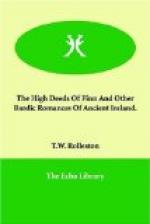One would think that poetry, which arose so early in a nation’s life, would have developed fully. But this was not the case in Ireland. No narrative, dramatic, didactic, or epic poetry of any importance arose, and many questions and answers might be made concerning this curious restriction of development. The most probable solution of this problem is that there was never enough peace in Ireland or continuity of national existence or unity, to allow of a continuous development of any one of the arts into all its forms. Irish poetry never advanced beyond the lyric. In that form it lasted all through the centuries; it lasts still at the present day, and Douglas Hyde has proved how much charm belongs to it in his book on the Love Songs of Connacht.
It has had a long, long history; it has passed through many phases; it has sung of love and sorrow, of national wars and hopes, of Ireland herself as the Queen of Sorrow, of exile regrets from alien shores, of rebellion, of hatred of England, of political strife, in ballads sung in the streets, of a thousand issues of daily life and death—but of world-wide affairs, of great passions and duties and fates evolving in epic or clashing in drama, of continuous human lives in narrative (except in prose), of the social life of cities or of philosophic thought enshrined in stately verse, it has not sung. What it may do in the future, if Irish again becomes a tongue of literature in lofty poetry, lies on the knees of the gods. I wish it well, but such a development seems now too late. The Irish genius, if it is to speak in drama, in narrative poetry or in an epic, must speak, if it is to influence or to charm the world beyond the Irish shore, in a world-language like English, and of international as well as of Irish humanity.
These elements on which I have dwelt seem to me the most distinctive, the most Irish, in the Tales in this book. There are many others on which a more minute analysis might exercise itself, phases of feeling concerning war or love or friendship or honour or the passions, but these are not specially Irish. They belong to common human nature, and have their close analogies in other mythologies, in other Folk-tales, in other Sagas. I need not touch them here. But there is one element in all the Irish tales which I have not yet mentioned, and it brings all the others within its own circumference, and suffuses them with its own atmosphere. It is the love of Ireland, of the land itself for its own sake—a mystic, spiritual imaginative passion which in the soul of the dweller in the country is a constant joy, and in the heart of the exile is a sick yearning for return. There are not many direct expressions of this in the stories; but it underlies the whole of them, and it is also in the air they breathe. But now and again it does find clear expression, and in each of the cycles we have discussed. When the sons of Turenn are returning, wounded to death, from the Hill of




